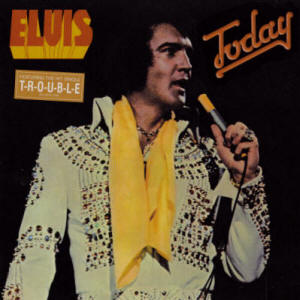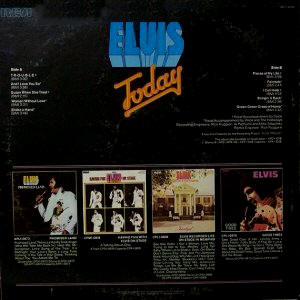

In 1975 RCA seemed to fire off one Presley
album after another. In January there had been
"Promised Land", followed by the greatest hits
compilation "Pure Gold" in March. Now it was May
and "Elvis Today" hit the stores. On June 7th
Billboard listed the longplayer on their "Top
LPs Chart", were it stayed for 13 weeks and
peaked at number 57. On June 28th "Elvis Today"
also entered the "Hot Country LPs Chart". Here
it had a run of 37 weeks and made it up to
number 4. In Japan the album won the Best Seller
Award, in Europe the success was just moderate.
During the initial sales period RCA retailed
400,000 units, worldwide 2 million copies were
sold. Translated to the present the physical
amount equals 300 million paid streams of the
complete album or 3 billion paid streams of
individual tracks.
In 2016 the complete Presley catalogue was
restored and remastered by Vic Anesini for a
boxed set of 60 compact discs called "The Album
Collection". Sony Music Entertainment provides
the streaming platforms with the same versions
of the individual albums (some of them offering
bonus tracks), albeit in 24 bit/90 khz flac.
That means, if the platform of your choice
supports high resolution audio, you can enjoy
the tracks in the same quality Sony used to scan
and master them. On Spotify, which has a market
share of approximately 30% and is the only
platform that publishes streaming figures,
"Elvis Today" accumulates 530 million streams.
500 million of them can be allocated to the
"Legacy Edition", which also features undubbed
master takes and a concert recording. This is
another example of an album, that was not
received well in its time, but gained a lot of
popularity over the decades.
In contrast to what the title suggested RCA
didn't use a current photo of the singer. To
hide his weight gain Colonel Parker made sure
the cover showed an older picture (shot in the
summer of 1973) on which his client looked slim
and tanned. The backside of the sleeve
advertised Elvis' latest four RCA albums.
The album was recorded between March 10th and
12th, 1975 at RCA Studio C in
Hollywood/California. It was produced by Felton
Jarvis and engineered by Rick Ruggieri. Because
Elvis wanted to rehearse for his upcoming Vegas
engagement afterwards, he used his stage band
for the recording sessions, too. This group
consisted of James Burton (guitar), John
Wilkinson (guitar), Charlie Hodge (guitar), Duke
Bardwell (bass), Ronnie Tutt (drums) and Glen D.
Hardin (piano). Further musicians were David
Briggs (clavinet), Greg Gordon (clavinet) and
Tony Brown (piano). The harmony vocals were
provided by Voice (Donnie Sumner, Tim Baty,
Sherrill Nielsen and Tommy Hensley). Between
April 8th and 14th there were overdub sessions
at the Quadrafonic Sound Studio in
Nashville/Tennessee. Further instruments and
voices were added and the bass tracks of Duke
Bardwell were replaced. The only exception was
"T-R-O-U-B-L-E", which was prepared for release
before the overdub sessions took place. In total
"Elvis Today" has a running time of 34:50
minutes.
30 years after the original release Follow
That Dream Records issued a collector's edition
of the album. It included the tracks of the
album, rough mixes and outtakes. For a review
tap
HERE.
T-R-O-U-B-L-E
Even though it's a rock'n'roll song in classic
Jerry Lee Lewis style, Elvis performs it without
any aggression. I like his relaxed, but still
powerfull vocals very much. No wonder, RCA
released "T-R-O-U-B-L-E" on a single. Between
April and August 1975 it was also a regular
feature of his live show. The song was written
by Jerry Chesnut especially for Elvis, who
recorded it on March 11, 1975 within four takes.
And I Love You So
In 1973 Perry Como scored a top 30 hit with "And
I Love You So", but the first release was four
years earlier by Don McLean, who had also
written it. Elvis taped the ballad on March 10,
1975 and selected the 10th attempt for post
production. On April 8th a new bass track was
recorded, later Felton Jarvis added harmony
vocals (April 9th), brass (April 10th) and
strings (April 14th). Elvis sings very emotional
and the song accentuates his great voice.
Between 1975 and 1977 "And I Love You So" was
included in many shows, a live version from June
19, 1977 can be heared on "Elvis In Concert".
But it has to be said that it doesn't even come
close to his great studio recording.
Susan When She Tried
The singer remembers his bygone loves and
realizes, that none of them was like Susan. In
contrast to many other songs of this kind, this
one is no mourning ballad, but an uptempo
country-pop. Elvis obviously has fun and I like
"Susan When She Tried", too. The song was
written by Don Reid and released by The Statler
Brothers in 1973. The king covered it on March
11, 1975 and needed six takes to get it right.
On April 8th the bass part was re-recorded and
the track was shortened of 40 seconds.
Woman Without Love
This ballad was also written by Jerry Chesnut,
but not especially for Elvis. The original
recording was by Bob Luman in 1968. The king
followed him on March 11, 1975 and taped the
song in a single attempt. The harmony voices
were added on April 9th, the strings followed on
April 14th. Because the narrator's wife knows
that he doesn't love her and therefore often
cries at night, he comes to the conclusion, that
a man without love is only half of a man, but a
woman is nothing at all. I guess humbug like
that was already considered reactionary in the
70s of the past century, but the melody is nice
and Elvis performs the song with emotion.
Shake A Hand
In 1953 Faye Adams' original recording had
blocked the number one spot of the "R&B Charts"
for nine weeks. Elvis recorded the song by Joe
Morris on March 11, 1975 within 3 takes. His
performance has a touch of gospel, which I like
very much. Later the track was enhanced with a
new bass track (April 8th), harmony vocals
(April 9th) and horns (April 10th).
Pieces Of My Life
One could really believe, that this is Elvis'
life confession. His career as a singer, the
women, the failed marriage. Everything is there.
If the waterglass full of whiskey was
substituted by a handfull of pills it would fit
in every detail. On top of that the king
performs the song with much emotion, it seems he
takes the listener into his confidence. In fact,
"Pieces Of My Life" has nothing to do with Elvis
at all. It was written by Troy Seals, who also
released the song in 1973 on an album. The king
recorded it on March 12, 1975, the fourth take
was approved for post production. On April 8th
the bass track was re-recorded, six days later
strings were added.
Fairytale
The country-pop was written by Anita and Bonnie
Pointer and became a top 20 hit for The Pointer
Sisters in 1974. Elvis recorded his version on
March 10, 1975 within three takes. On April 8th
Felton Jarvis added a fiddle and re-recorded the
bass track, harmony vocals were taped the
following day. The production was finalized on
April 14th with the addition of strings and the
shortening of the recording of 50 seconds. The
narrator confronts his partner with her coldness
and Elvis' voice is full of sandness and anger.
I like the song very much. "Fairytale" was also
a more or less regular feature of the king's
live shows and can be found on "Elvis In
Concert" (1977). This version was also taped on
June 19, 1977 and doesn't hold a candle to the
studio recording.
I Can Help
Elvis recorded "I Can Help" on March 10, 1975
within a single take. Officially the master is
take 2, but the first take was nothing but a
false start. Another try might have been a good
idea, because the king can be heared gasping for
breath here and there. But that doesn't keep me
from loving this track, because the performance
sounds so spontaneous and everybody obviously
has fun. Felton Jarvis enhanced the track with
the re-recording of the bass track (April 8th),
harmony vocals (April 9th) and horns (April
10th). The harmony vocals were later removed on
Elvis' behalf. "I Can Help" was written by Billy
Swan, who scored a number one hit with the song
in late 1974.
Bringing It Back
The sentimental ballad was written by Greg
Gordon and recorded in January 1975 by Brenda
Lee. Elvis taped his version on March 12, 1975
within four takes. On April 8th the bass track
was re-recorded, harmony vocals were added the
following day. On April 14th the track was
further enhanced with strings. Even though
Brenda Lee was the first to record "Bringing It
Back", Elvis was the first to release the song.
When Brenda scored a minor hit with it in the
fall of 1975, RCA jumped on the bandwagon and
quickly released Elvis' version on a single,
too. But the plan didn't work out at all and the
45 became a commercial flop.
Green Green Grass Of Home
The narrator returns to his old homeland, meets
his family and his beloved Mary and visits
places of his childhood and youth. But in the
thrid verse it gets obvious, that he is just
dreaming and actually sitting in a death cell,
where he awaits the capital punishment. "Green
Green Grass Of Home" was written by Claude
Putman jr. and was recorded first by Johnny
Darrell. In 1966 Tom Jones scored a number one
hit with the song on the "UK Charts" and it was
his recording that got Elvis' attention. It is
said that he once was on a trip back to Memphis
and called the radio station several times and
asked them to play the song. However, it took
him almost a decade before he recorded "Green
Green Grass Of Home" himself. On March 10, 1975
he needed five takes to archive a satisfactory
result. The master take was enhanced with a new
bass track (April 8th), harmony voices (April
9th) and strings (April 14th).
Verdict
Most of the tracks on this album are
covers of more or less recent country songs,
but they fit Elvis like a glove. His voice
is strong and it's obvious how much he liked
this kind of music. To me "Elvis Today" is
one of his strongest albums of the decade.

(C) RCA Records
![]()

